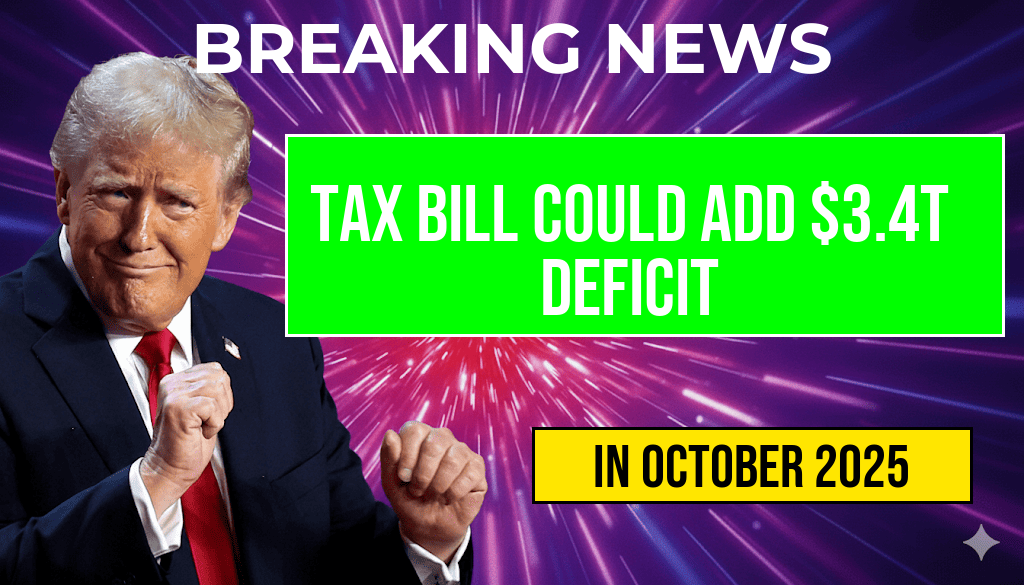Amid ongoing debates over proposed federal legislation, critics warn that the so-called “One Big Beautiful Bill” could significantly expand the national deficit by approximately $3.4 trillion. The legislation, touted as a comprehensive package aimed at addressing multiple economic and social issues, faces scrutiny over its projected fiscal impact. Economists and budget analysts caution that the measure’s expansive scope and generous spending provisions could undermine fiscal responsibility, potentially leading to higher interest rates and increased borrowing costs for decades to come. As policymakers weigh the bill’s potential benefits against its fiscal risks, taxpayers and stakeholders are urged to closely examine its long-term implications for the national debt and economic stability. The debate underscores the challenge of balancing urgent policy needs with sustainable fiscal management amid a complex economic landscape.
Understanding the Fiscal Projection
Key Components of the Legislation
- Massive investments in infrastructure, estimated at over $1 trillion
- Expanded social welfare programs, including healthcare and education funding
- Tax incentives aimed at promoting renewable energy and technology innovation
- Provisions for climate change mitigation, with substantial federal grants and subsidies
Projected Impact on the Federal Budget
| Component | Cost (in trillions) |
|---|---|
| Infrastructure Investment | $1.2 |
| Social Programs Expansion | $1.0 |
| Tax Incentives and Credits | $0.8 |
| Climate and Green Initiatives | $0.4 |
| Total | $3.4 |
Officials from the Congressional Budget Office (CBO) have highlighted that without offsetting revenue measures, the bill could add approximately $3.4 trillion to the federal deficit over the next decade. This projection accounts for both direct spending and the anticipated economic growth effects, which some analysts believe may not fully offset the initial fiscal outlays.
Economic and Fiscal Concerns
Potential Long-Term Consequences
Economists warn that a substantial increase in the deficit could lead to higher interest rates, making borrowing more expensive for both the government and consumers. Increased borrowing costs could crowd out private investment, potentially slowing economic growth. Moreover, a rising debt burden may limit policymakers’ flexibility to respond to future economic downturns or emergencies.
Political Responses and Negotiations
Opposition parties and fiscal conservatives have voiced concerns over the bill’s affordability, urging for stricter budget controls and revenue-raising measures. Some lawmakers advocate for a more targeted approach, emphasizing cost-effectiveness and fiscal responsibility. Conversely, proponents argue that the investments are vital for long-term economic resilience and social equity, asserting that the short-term deficit increase is justified by anticipated future benefits.
Historical Context and Comparisons
Recent Legislative Trends
Historically, large-scale legislation with significant fiscal implications has faced similar scrutiny. Notably, recent infrastructure and stimulus bills have been scrutinized for their impact on the debt. According to data from Wikipedia’s page on the US national debt, federal borrowing has surged during periods of major legislative initiatives, raising questions about long-term fiscal sustainability.
Lessons from Past Debates
Past debates, such as those surrounding the Affordable Care Act or the 2008 stimulus package, demonstrate that balancing investment-driven growth with debt management remains a persistent challenge. Experts suggest that transparent accounting and robust oversight are critical to ensuring fiscal prudence in implementing such comprehensive legislation.
Public Sentiment and Future Outlook
Public opinion remains divided, with some viewing the bill as a necessary investment in America’s future, while others express concern over mounting debt and potential tax increases. As negotiations continue, stakeholders are watching closely to see whether revisions or supplementary measures could mitigate the projected deficit increase. The coming weeks are expected to reveal whether compromises can be reached to balance ambitious policy goals with fiscal prudence.
For more detailed information on federal budget projections and legislative impacts, visit the Congressional Budget Office’s official reports and the White House statement on the bill.
Frequently Asked Questions
What is the main concern highlighted in the article?
The primary concern is that the ‘One Big Beautiful Bill’ could potentially increase the federal deficit by three point four trillion dollars.
How might the bill impact the national deficit?
The bill’s provisions could significantly raise the deficit by approximately $3.4 trillion, raising questions about its fiscal sustainability and long-term economic impact.
What are the potential economic consequences of the bill’s passage?
If enacted, the bill could lead to increased government borrowing, higher interest rates, and potential strain on public finances, affecting overall economic stability.
Are there any specific provisions in the bill that contribute to the deficit increase?
While the article does not detail specific provisions, it emphasizes that the overall cost of the bill and its tax and spending policies are expected to substantially raise the deficit.
What should taxpayers be aware of regarding this bill?
Taxpayers should be aware that passing the bill could lead to increased national debt, which might impact public services, taxes, and economic health in the future.










